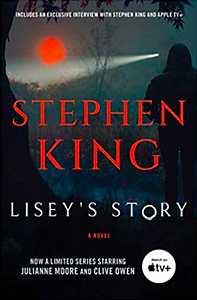Take a photo of a barcode or cover
A reread; rather, a first read after an audio read a couple of years ago (which was excellent).
I think you have to be a fan of both "literature" and "pulp" in order to like this book.
On the literature side, King digs so deep into people's character's that the pace resembles that of a Joyce Carol Oats novel: fascinating, but slow. Lisey's just this person; her husband the famous writer is the one who ever did anything outwardly significant. But, from a literary perspective, that makes her all the more worth exploring: a person who sees herself as a person, digging through memories of her husband, who, we see, sees her as everything, a superhero.
On the pulp side, we have the writer's story, full of crazy people, monsters that take over people's bodies before you even have a chance to say goodbye, an alternate land with rules almost as bad as those in the movie Gremlins. Ghosts, myths, monsters, more.
Two of the demons from the writer's world start haunting Lisey: a human monster, and a monster who threatens to take over her sister. Can literature, when necessary, defeat pulp? It sounds silly, but with the help of a little Hamburger Helper, it can: it's almost like the message here is "when literature gets its hands dirty, it, too, can kick some mighty ass." Probably not a conscious message on King's part, but I seem to remember him talking about the divide between genre (the descendents of pulp) and literature being artificial at some point.
At any rate, I love the blending of the two sets of techniques in one novel. I just love it.
I think you have to be a fan of both "literature" and "pulp" in order to like this book.
On the literature side, King digs so deep into people's character's that the pace resembles that of a Joyce Carol Oats novel: fascinating, but slow. Lisey's just this person; her husband the famous writer is the one who ever did anything outwardly significant. But, from a literary perspective, that makes her all the more worth exploring: a person who sees herself as a person, digging through memories of her husband, who, we see, sees her as everything, a superhero.
On the pulp side, we have the writer's story, full of crazy people, monsters that take over people's bodies before you even have a chance to say goodbye, an alternate land with rules almost as bad as those in the movie Gremlins. Ghosts, myths, monsters, more.
Two of the demons from the writer's world start haunting Lisey: a human monster, and a monster who threatens to take over her sister. Can literature, when necessary, defeat pulp? It sounds silly, but with the help of a little Hamburger Helper, it can: it's almost like the message here is "when literature gets its hands dirty, it, too, can kick some mighty ass." Probably not a conscious message on King's part, but I seem to remember him talking about the divide between genre (the descendents of pulp) and literature being artificial at some point.
At any rate, I love the blending of the two sets of techniques in one novel. I just love it.
4.5 stars.
I know King has mentioned in the past that this is his favorite book that he's written, and I think it shows in a lot of ways. Obviously he's an author who's never been afraid to write about writing -- whether we're talking about Jack Torrance or his memoir/instructional piece of non-fiction, On Writing. But here I think we get a glimpse, however slight, into how he feels about writing, the dark places he and other horror writers delve, and marriage as a union, both physical and spiritual.
I know King has mentioned in the past that this is his favorite book that he's written, and I think it shows in a lot of ways. Obviously he's an author who's never been afraid to write about writing -- whether we're talking about Jack Torrance or his memoir/instructional piece of non-fiction, On Writing. But here I think we get a glimpse, however slight, into how he feels about writing, the dark places he and other horror writers delve, and marriage as a union, both physical and spiritual.
dark
emotional
tense
slow-paced
Plot or Character Driven:
A mix
Strong character development:
Yes
Loveable characters:
Complicated
Diverse cast of characters:
No
Flaws of characters a main focus:
Yes
challenging
dark
mysterious
tense
medium-paced
Plot or Character Driven:
Character
Strong character development:
Yes
Loveable characters:
No
Diverse cast of characters:
No
Flaws of characters a main focus:
No
Simply amazing. Stephen King's brilliant writing never ceases to amaze me.
King’s novel about a wife coming to terms with the death of her husband as well as what to do with his belongings isn’t a horror novel in the usual sense, and quite frankly, if it wasn’t for one scene I doubt that it would be classified as a horror novel.
King can write women, and he does not describe women by the size of their breasts.
The most real sequence of the book includes Lisey’s various relationships with those in her life – her sisters and husband. Her husband’s death is only a small part of the challenges that she faces, for her sisters have their problems as well. Then Linsey gets what could be a message from her decreased husband, whose past was a bit unusual. And then there is the matter of the stalker.
The novel works because the characters are so believable. You root for Lise’s because she is someone that you could know.
One does wonder if there are shades of King’s own marriage in the novel for Lisey and Scoot might not have a the traditional trope of a perfect marriage but it was a good strong marriage. Just as her relationships with her sisters are not perfect but good and strong. The relationships are at the heart of the novel, and while there is some King violence, it is not the most King violence.
I have read enough King to understand the Castle Rock references and connection, but not enough to know how it ties into the larger picture. But the sense of a small town where people watch out for each other and take care of each other.
The idea of grief and moving one is also a center theme to the story, and in many ways is the soul of the novel. The supernatural aspect to the story makes it fantasy but the real human lives
King can write women, and he does not describe women by the size of their breasts.
The most real sequence of the book includes Lisey’s various relationships with those in her life – her sisters and husband. Her husband’s death is only a small part of the challenges that she faces, for her sisters have their problems as well. Then Linsey gets what could be a message from her decreased husband, whose past was a bit unusual. And then there is the matter of the stalker.
The novel works because the characters are so believable. You root for Lise’s because she is someone that you could know.
One does wonder if there are shades of King’s own marriage in the novel for Lisey and Scoot might not have a the traditional trope of a perfect marriage but it was a good strong marriage. Just as her relationships with her sisters are not perfect but good and strong. The relationships are at the heart of the novel, and while there is some King violence, it is not the most King violence.
I have read enough King to understand the Castle Rock references and connection, but not enough to know how it ties into the larger picture. But the sense of a small town where people watch out for each other and take care of each other.
The idea of grief and moving one is also a center theme to the story, and in many ways is the soul of the novel. The supernatural aspect to the story makes it fantasy but the real human lives
This was my third time reading this book because it’s one of my favorites. It’s a very different type of story compared to normal Stephen King books. I love Boo’ya Moon, it’s so magical there but still has the signature King creepiness.
I promised myself I could stop reading if he said "puffickly huh-yooge batch of orifice" one more time. Took another few paragraphs.
A bit too long and a story that I didn't enjoy as much as I thought I would.
dark
emotional
hopeful
mysterious
sad
slow-paced







